Fortunately, for all their control, control, we must have control attitude, the CBC actually has an open attitude towards the copying their content:
The materials available via this CBC/SRC Website may be copied in whole or in part for private and/or non-commercial use, provided that copyright ownership is acknowledged. Under no circumstances may copies be sold without prior written permission from the CBC or the copyright owner concerned.
To enable more of this “copying in whole or in part,” here’s a tutorial on how you can, if you have a Mac, save CBC’s streaming audio, and spread it around digitally.
First, you need to download a copy of Audio Hijack. And you should probably pay the $16US shareware fee, both because you’ll only have 10 minutes use of the program otherwise, and because it’s a very cool program, and the programmer deserves your support.
Second, you need a download a copy of the RealOne Player. You don’t need the fancy-pants version you have to pay for: look for the links to the “Free RealOne Player” on their website and download and install that.
Audio Hijack is a program that does with audio what Activewords does with keystrokes: it grabs the audio before it gets dealt with otherwise by the operating system, and lets you EQ it, filter it, and/or record it.
Once you’ve downloaded and installed Audio Hijack, start it up, and select File \| New Preset from the menu.
Enter something like “CBC RealAudio” for the Preset Name, then click on Select in the Application section, and find the RealOne Player in your Applications folder and click Open.
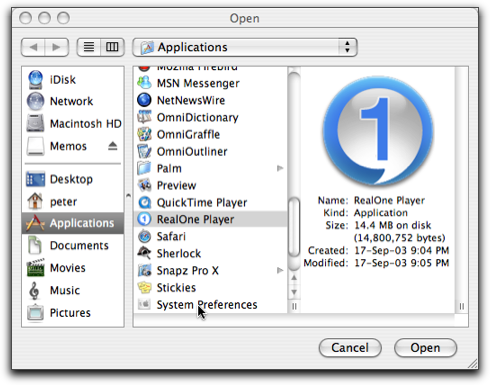
Next, check the “Open URL/File/AppleScript” box, and enter http://pei.cbc.ca/charlottetown.ram in the box below. You can actually enter your local CBC’s streaming audio URL here if you like; using this one will get you audio from Charlottetown. To find you local CBC’s audio stream URL, just hold down Control while clicking on the “listen live” link on the relevant CBC website:
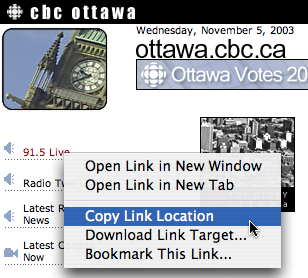
…and select “Copy Link Location”. This will copy the URL to your clipboard, and you can then, using Command + V, copy it into Audio Hijack.
At this point, your Preset window will look like this:
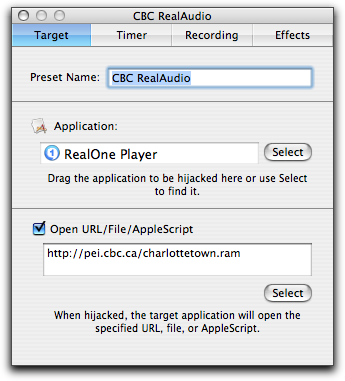
Next, click on the Recording tab, and under “When Finished Recording,” select “Encode to MP3 with iTunes.” The tab will now look like this:
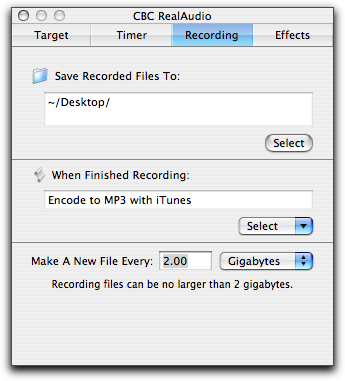
You can now close this window, and you should see the following in your main Audio Hijack window:
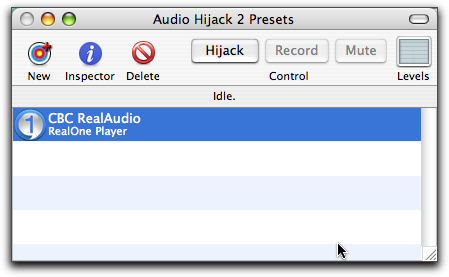
You’re now set up and ready to record the CBC’s audio stream at your leisure. To start listening to the CBC (you won’t be recording yet), just select the Preset you just created and click on Hijack. This will start up the RealOne Player automatically, tune it to the CBC, and start playing. You’ll see “CBC RealAudio: Active” in the status bar, along with a counter of the number of seconds the CBC has been playing:
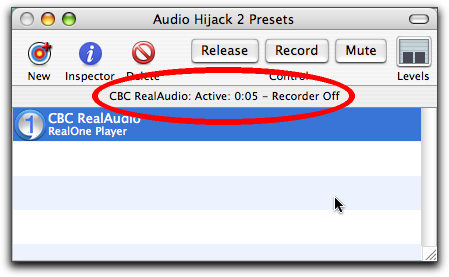
Once you’re ready to record, just click on the Record button, and Audio Hijack will start recording the audio to a file on your hard disk. When you want to stop recording, just click on the Record button again. At this point, Audio Hijack will automatically start up iTunes, convert your recording into an MP3 file, and leave it ready for you to listen to, save, email, or post to a website:
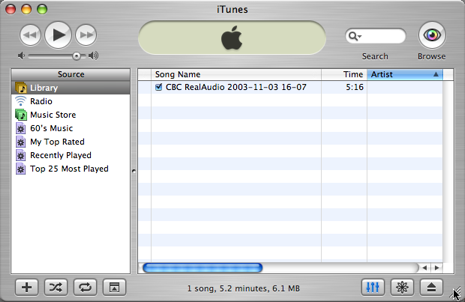
Remember that the CBC allows copying “provided that copyright ownership is acknowledged,” so if you distribute the files you record, you should ensure that the CBC is credited as the source.
 I am
I am
Comments
Very good guide, Peter. One
Very good guide, Peter. One point on the acknowledgement.
Just to be on the wackily and prudent safe side, also mention the copyright interests of others within the piece, either generally or, better, specifically.
Music, say, or other works in a CBC piece may be under license to the CBC for broadcast but not for recopying on with acknowledgement (or perhaps not but we hope CBC types have vetted that already).
Another technique: use the
Another technique: use the analog hole. Basically, run a line from your headphone/speaker jack to your line-in jack - play the realaudio, and record the line-in.
Good point, Stephen. Of
Good point, Stephen. Of course that method involves a quick trip to Radio Shack for the ill-equipped.
Is there such a thing as a
Is there such a thing as a “quick trip” to Radio Shack?
…sigh.
Good point Alan. I wouldn’t
Good point Alan. I wouldn’t want anyone copying my Parkdale stuff without my permission.
Cyn, my darlin .. you might
Cyn, my darlin .. you might wanna have a close read of your contracts. Things may have changed - things sometimes do at CBC, albeit at a glacial pace - but for years, one of the huge beefs that freelancers had with CBC was that CBC controlled ALL rights to their work. In other words, I couldn’t use my own material in any way without the express written consent of CBC. My rights to what I had done were inconsequential to them. As I say, things might have changed … but given the Canadian Media Guild’s historic lack of concern with freelancer’s rights, I’m gonna guess you’ll look at your contract and say “WTF???”
A freelancer may not like it,
A freelancer may not like it, but CBC controlling all rights is probably what allows them to have the open attitude towards the copying that Peter praised in the original post. From a public good point of view it’s great that all content from our public broadcaster is available to copy and share. This allows for the creation of public archives that can be accessible online.
That is one kind of copyright
That is one kind of copyright but consider also the playing of music under the SOCAN license for broadcasting not extending to the recopying of it into new media. Nathan is right that when the public archives are going, like the BBC plans to do, it will be a great benefit to all.
But the BBC is spending much time and money in changing its licenses and agreements with those in the archives to ensure that the archive will be legitimate. Surely the CBC could not have had that legal work properly done already -before the thought of the media upon which the archive would sit. Check your paper as Nils says but maybe check with a new media / entertainment lawyer as well if you see value in it to you. Nate can recommend one I bet;-)
At the risk of pushing this
At the risk of pushing this thread slightly off-topic (a ship that sailed with my first response, sorry): Coerced appropriation of artists’ rights doesn’t feel like my definition of “the public good”, and I’m not particularly comforted that they have an “open attitude” towards folks copying my stuff. Sure, one could argue that if we don’t like it, don’t sign. But that assumes there’s another game in town, which there ain’t. I was never against CBC owning or archiving my work (which, after all they paid for). What rankled was that I would have to ask THEM for express written permission to use or share the product of MY work.
Nils my darlin’…apparently
Nils my darlin’…apparently things have changed. I’ve had ownership of my material since day one and it’ll probably stay that way.
According to my contract under Copyright Article 33.8, “copyright in the Contribution shall be held by the Freelance Contributor at all times.”
So, I’ll say what I said before. I wouldn’t want anyone copying my Parkdale stuff without my permission. Archival or not.
If content is aired publicly
If content is aired publicly by the national public broadcaster, why shouldn’t it be available in a public archive?
It is a distinction based on
It is a distinction based on use - which is, admittedly, behind the capabilties of technology, but not, as Cyn points out, behind the interests of the authors of works placed upon those media. That is why the licenses, which are drafted like the SOCAN one over Canadian music by the representatives of the artists, address each media and/or each performance context separately - broadcasting on radio is separate from playing in a shop or in a bar. It is just like a software license - you can use the widget but you cannot pass on it to the next person.
We have a conundrum. If the capabilities of technology were placed into full use, the ability of artists to control their work and make a living off it would be undermined to the point that the technologies would have no worthwhile content - no one makes a living off the creative commons. The archive the BBC is creating is so important as it will include working out agreements to form a precedent for balancing the interests so that many more of these archives can come into being.
Cyn, my love … I couldn’t be
Cyn, my love … I couldn’t be more delighted to hear that the rights issue has finally been addressed. It stuck in the craw of a lot of us who resented being told our work wasn’t ours - that copyright rested in the Corp.
Alan, thank you for the illumination …
And Nathan, I don’t mind artists’ work being publicly available if the artists are compensated fairly for that work. Hell, I’d buy a Parkdale Doris Cd anyday …
I’d like to challenge you’re
I’d like to challenge you’re copyright claim. Nowhere on the website did I find this statement.
From http://www.cbc.ca/aboutcbc/dis… :
NY USE, REPRODUCTION, ALTERATION, MODIFICATION, PUBLIC PERFORMANCE OR DISPLAY, UPLOADING OR POSTING ONTO THE INTERNET, TRANSMISSION, REDISTRIBUTION OR OTHER EXPLOITATION OF THE WEBSITE OR OF ANY CONTENT, WHETHER IN WHOLE OR IN PART, OTHER THAN EXPRESSLY SET OUT HEREIN, IS PROHIBITED WITHOUT THE EXPRESS WRITTEN PERMISSION OF CBC/SRC.
This leads me to believe that you cannot create copies of their work without permission from them.
Hi folks. I’ve been trying to
Hi folks. I’ve been trying to get Ideas for a week or so now using Audio Hijack Pro. I’ve got it on a timer but every morning when I check the recording stopped after 12 to 16 minutes (even though the timer setting is for 57 minutes and the file size is set to 2 gigs). Anyone else have this problem? Or suggestions?
Mila grazi
Add new comment